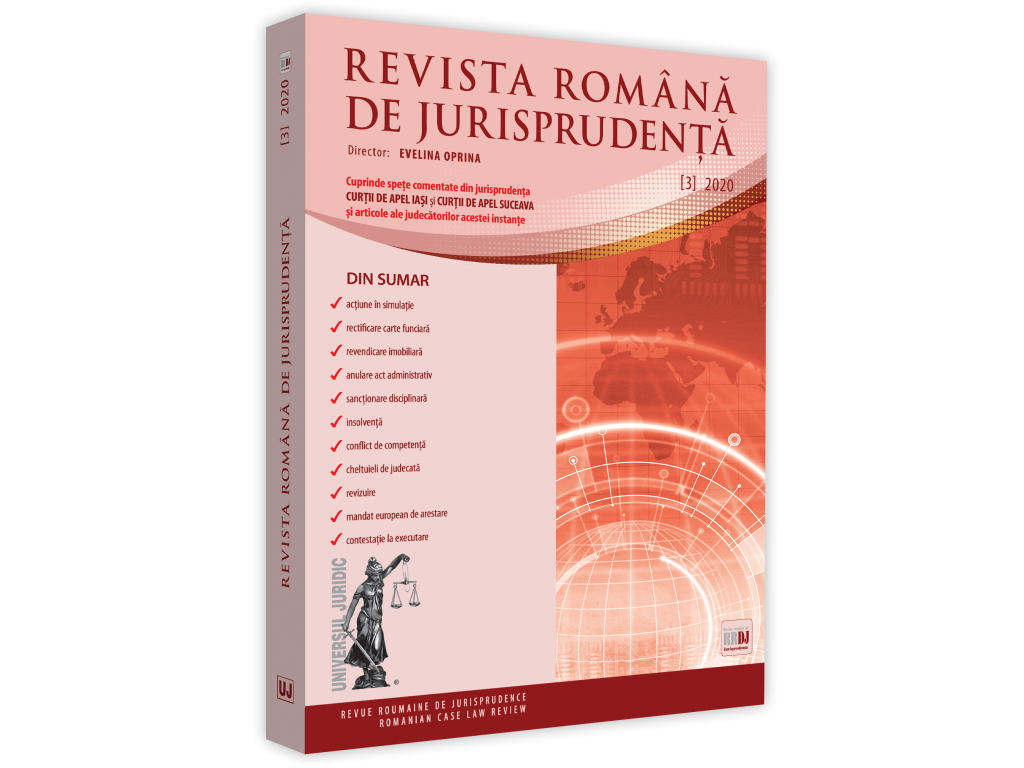44. Respingere cerere de extrădare. Lipsa dublei încriminări
44. Denial of the claim for extradition. Lack of double incrimination
Author(s): Diana Mihaela Cheptene-MicuSubject(s): Law, Constitution, Jurisprudence, Civil Law
Published by: Universul Juridic
Keywords: the claim for extradition; double incrimination; criminal law;
Summary/Abstract: In the claim for extradition, the Romanian court must verify if the facts are offences also according to the Romanian law and the acts submitted until now in the case file do not clarify the localization of the fracture on the tibia which is paramount in the mandatory analysis of confirmation of the double incrimination and by reference to the provisions of the Convention from Paris on extradition, the bilateral Treaty of Romania and the Republic of Moldova and pursuant to the provisions of Law 302/2004, as amended. Between the two states, regarding extradition, two instruments are applicable, one with universal vocation, respectively the European Convention on Extradition in Paris and one bilateral interstate, respectively the Treaty between Romania and the Republic of Moldova on legal assistance in civil and criminal matters, which has not been reported so far, according to Art. 100 of the Treaty. The coexistence of the two legal instruments in the matter of extradition is supported by Art. 28 para. (2) of the Convention, as long as the Bilateral Treaty between Romanian and the Republic of Moldova, later ratified to the Convention by Romania, provides supplements to facilitate the application of the principles from the Convention. In the field of double incrimination, to which the Convention refers by the regulations of Art. 2, expressly reflecting that the actions sanctioned by the laws of the applicant and of the requested party are subject to extradition in certain conditions on the amount of the sanctions provided by the law or applied (therefore the actions must be confirmed as offences on the territory of both states because only in this way can be sanctioned with punishments, custodial punishments), the bilateral Treaty between Romanian and the Republic of Moldova, according to Art. 28 of the Convention supplements its provisions to facilitate the application of the principles of the Convention, therefore it states in Art. 64, called “the obligation of extradition”, the principle of double incrimination and states in para. (2) that “extradition is admitted only if the action subject to the claim for extradition is a crime according to the laws of both contracting parties”, and para. (4) sets forth that an offence is sanctioned by the laws of both contracting parties is not conditional upon the fact that the laws of the contracting parties place the action in the same category of offences or name it by the same terminology. Since the European Extradition Convention from Paris of 1957 provides expressly the double incrimination, under the regulation of Art. 2, the provisions of Art. 24 para. (2) of Law 302/2004 are not applicable. In the criminal regulations in Romania, a traffic accident with victims is an offence if the injuries caused to the victim exceed 90 days of medical care. The items extracted from the documents submitted in the claim for extradition, i.e. the court decisions, the medical documents that were transmitted further to the initial claim for supplementary information, related to the verifications ruled by the Romanian court at Iasi Institute for Forensic Medicine, are not sufficient data to set the number of days of medical care either under 90 days or over 90 days. In relation to these findings regarding the number of days of medical care necessary to heal the victim, it is noted that there is no double incrimination of the facts of the extraditable person, because they do not constitute an offence under Romanian law.
Journal: Revista Română de Jurisprudenţă
- Issue Year: 2020
- Issue No: 03
- Page Range: 312-327
- Page Count: 16
- Language: Romanian
- Content File-PDF

